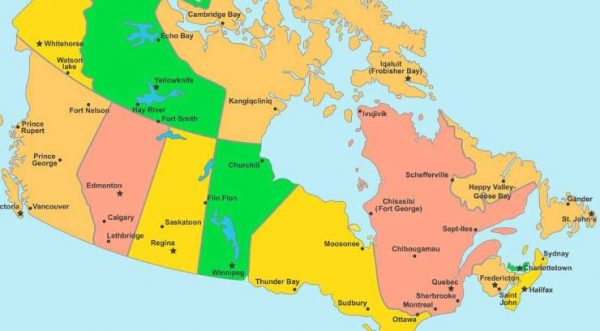In Spain, much like other places in Europe or North America (Canada and USA), the virtual casino sector is coming up against land-based casinos. While online casino games are allowed in Canada, every individual Canadian province has its own rules.
To date, four Canadian provinces have regularized gambling on their territory; Quebec, Ontario, Manitoba and British Columbia. As a result, the field of online casinos in these areas is very successful. This is confirmed by the annual statistics published by the provinces that officially authorize the operation of casino sites.
What about provinces rejecting online gambling?
The peculiarity of Canada, unlike other countries, is that anyone residing on their land is entitled to play casino games wherever they want. This statement isn’t written into the criminal law code, but in practice it means that a Canadian player can’t be banned from visiting an online casino to gamble.
Therefore, slots or table game players from across Canada head to the web for some fun. In fact, virtual casinos, with just a few exceptions, accept all Canadian consumers.

Virtual casinos benefit from the digital economy
As with other sectors of the Canadian economy growing their online presence, casinos are no exception. It’s safe to assume that in just a few years, as in Europe today, the casino industry in Canada will digitize dramatically. We can use Italy, Spain and Belgium as concrete references on this subject.
These three European countries legalized Gambling online, in the broad sense of the term, in 2011, which caused the sector to transform. Statistics published on this topic speak for themselves – more than 75% of the real money bet at casinos is now on the internet. These numbers are not really known in Canada when it comes to online gambling, as no official state institute records this type of information.
On the other hand, one could easily say that more than half of Canadian gamblers prefer to play online rather than go to land-based casinos.
State-of-the-art casino sites
Since the introduction of the first virtual casinos in the ‘90s, online casino operators have continually improved their gaming space. The tools used by casino operators to provide a reliable gaming environment rely on advanced technical resources. For example, through auditing the Zodiac Casino site, a relatively popular online casino, you can see that this type of virtual casino is as reliable as it is impressive.
The only flaw is the waiting time between cashing-in and receiving your winnings. Payments can be made by credit card and debit card, but there is always a delay of 1 to 5 days to receive assets.
On the other hand, some Canadian online casinos accept Interac, a trustworthy electronic wallet system.
It’s a great option as most Canadian banks accept Interac as a means of payment and instant collection. This card is becoming more and more popular as an alternative to credit and debit cards. It’s no wonder, considering the benefits, that an increasing number of customer-friendly online casinos are implementing this system.
Real casino games and web browsers
Online casinos have mastered the web! Casino games, be it Roulette, Blackjack or slot machines, are loaded up on web browsers instantly. You don’t even need to install any software on PCs or mobile devices as the games are compatible via HTML pages. The HTML source code allows a web page to be viewed easily on a web browser.
Moreover, with the most innovative virtual casinos, there are gambling halls with real dealers at Blackjack and Roulette tables available. This innovation is made possible via a secure system connected to camera and streaming set-ups. With technology like this, you can feel like you’re in a real casino, live and without downloading, on-the-go or in the comfort of your own home.
Are these online casinos legal in Canada?
Although some provinces’ laws may be confusing, there are no real internet limitations in Canada. In fact, online casinos are legal as long as they don’t advertise in regions where online gambling isn’t yet legalized.

At a federal level, the Canadian state respects everyone’s rights. As a result, every person can surf and play on the internet freely. In short, when it comes to online casinos, there are no restrictions.
The new generation prefer playing online
With the boom of the digital age, and the habits of younger generations who rely on the internet and apps, online casinos have needed to follow suit. This online growth was triggered by an age group who mainly use mobile devices or computers to manage their personal and/or professional activities.
Just like e-books and e-readers, online casino platforms are now surfing on a wave that only seems to grow over time. It remains to be seen whether traditional land-based casinos will manage to survive the rise of virtual casinos. Naively, one might think that the Canadian Government will implement legal tools to benefit gambling houses on Canadian soil, but currently nothing of the sort has been planned.





